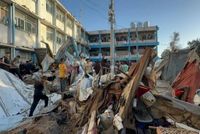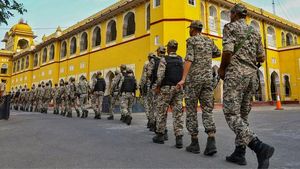Israeli airstrikes on Gaza have intensified, killing at least 61 people since dawn on May 7, 2025, as the ongoing blockade has led to severe food shortages and escalating humanitarian crises. The attacks have primarily targeted civilians in densely populated areas, exacerbating the already dire conditions faced by the Palestinian population.
One of the most devastating strikes occurred near the Thai and Palmyra restaurants on al-Wehda Street in Gaza City, where two missiles were fired simultaneously at locations just 100 meters apart, resulting in the deaths of at least 17 individuals. Al Jazeera’s Hani Mahmoud reported that the airstrike hit one of the few remaining places where Palestinians could obtain meals, leaving the area littered with debris and bloodstains from the casualties.
“The tables and chairs are all thrown around and blood stains the ground as a result of severe bleeding due to the attack,” Mahmoud recounted, as local residents and vendors surveyed the destruction. In another attack at a nearby intersection, he noted that people were “soaked in blood and shredded into pieces,” underscoring the brutality of the strikes.
On the same day, an airstrike targeted al-Karama School in the Tuffah neighborhood, killing 13 people and injuring several others. The school, which was sheltering displaced families, became a tragic symbol of the ongoing violence, with many victims trapped beneath the rubble. The Palestinian Ministry of Health reported that 38 Palestinians were killed and 145 injured in a wave of bombings throughout Gaza since early morning.
As the violence escalates, the humanitarian situation in Gaza deteriorates further. The Israeli blockade, which has been in place since March 2, 2025, has left the region deprived of essential supplies, including food and medical resources. Aid organizations have warned that food supplies are nearing total depletion, with a mother of six sheltering at a United Nations agency facility stating that they had run out of all food types except for bread.
“The State of Israel must lift the siege,” UNRWA tweeted on Wednesday, calling for urgent international action to prevent a further humanitarian catastrophe. Gaza’s health sector is also suffering, with 88 percent of hospital beds occupied and a critical shortage of medical disposables.
In response to the escalating crisis, Egypt and Qatar reaffirmed their commitment to mediating a ceasefire agreement aimed at alleviating the suffering of civilians. They emphasized the need for international cooperation to address the unprecedented humanitarian crisis in Gaza.
However, Israel has threatened to escalate military operations unless a ceasefire is reached. A spokesperson for Hamas, Basem Naim, dismissed the ceasefire talks as meaningless, insisting that discussions are futile while “the hunger war and extermination war continue in the Gaza Strip.”
The violence has not been limited to airstrikes. The Al-Qassam Brigades, Hamas’ military wing, reported inflicting casualties on Israeli forces by detonating a minefield east of Khan Yunis. They claimed to have ambushed an Israeli unit, resulting in casualties among soldiers and their dogs, further highlighting the ongoing conflict's complexity.
Since the onset of hostilities on October 7, 2023, the Palestinian Ministry of Health reports that over 52,615 Palestinians have been killed, with 118,752 others injured, the majority of whom are women and children. This staggering death toll underscores the devastating impact of the ongoing conflict on the civilian population.
The situation remains precarious as international actors grapple with the implications of the conflict. The British Foreign Office has publicly opposed the expansion of Israeli military operations in Gaza, following a recent Israeli government decision to fully occupy the territory. This decision coincided with the mobilization of tens of thousands of reserve soldiers, indicating an escalation of military engagement.
As the violence continues, the humanitarian conditions in Gaza are deteriorating rapidly. The blockade has not only restricted food supplies but has also hampered the delivery of medical aid, leaving hospitals overwhelmed and under-resourced.
Meanwhile, the international community watches as the conflict unfolds, with calls for intervention growing louder. The UN has urged for the immediate lifting of the blockade, while humanitarian organizations stress the need for a coordinated international response to prevent further loss of life.
In a tragic twist, the conflict has also claimed the life of Palestinian journalist Nour Abdu, who was killed while covering the Israeli airstrike on al-Karama School. His death highlights the risks faced by journalists in conflict zones, where the line between reporting and becoming a casualty can blur.
As the situation develops, the call for a ceasefire and humanitarian aid remains urgent. The international community must act decisively to address the humanitarian crisis and work towards a sustainable resolution to the ongoing conflict. The stakes are high, and the need for action has never been more critical.
In conclusion, the ongoing violence in Gaza has resulted in significant civilian casualties and a worsening humanitarian situation. The international community's response will be crucial in determining the future of the region and the lives of those caught in the crossfire.





